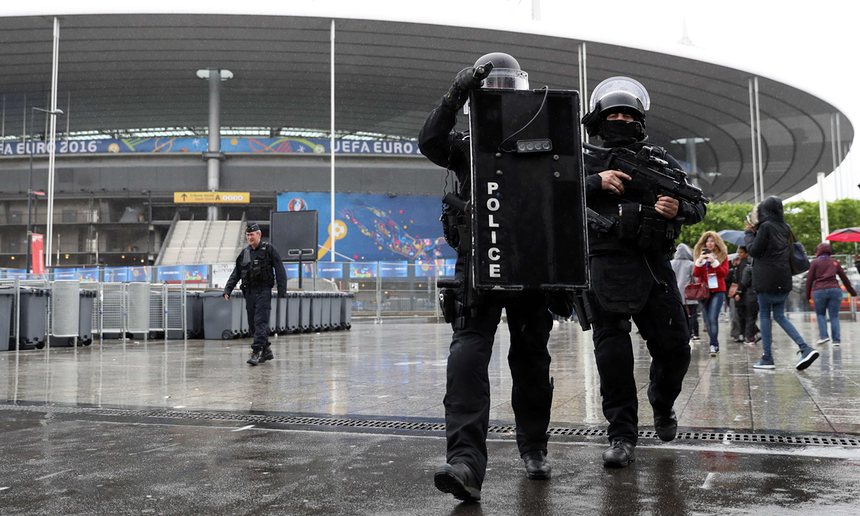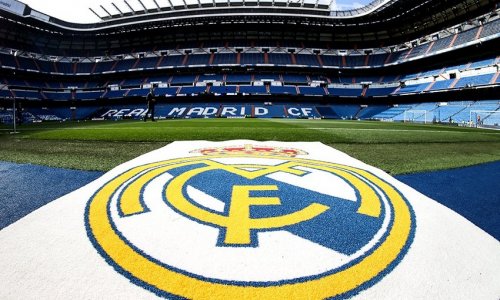Fans were leaving Lyon’s football stadium after a mock Northern Ireland-Ukraine match, when two fake suicide-bombers pretended to blow themselves up in the crowd. Volunteers posing as fans played dead, dozens more were injured, and the crowd panicked and charged. Police rushed to secure the area while paramedics treated victims oozing fake blood.
This simulated disaster scene last week was one of at least 30 doomsday scenarios staged by police and emergency services across France in the run-up to the Euro 2016 football tournament, which begins on 10 June. As France prepares to host more than 2.5 million ticketholders and millions more fans across 10 cities in one of Europe’s biggest events, the government is planning the heaviest sports security operation in recent history.
Just over six months after the Paris terrorist attacks killed 130 people at restaurants, a rock concert and the national stadium, President François Hollande said terrorism remains the biggest threat to the event despite strikes and protests against his proposed new labour laws.
Possible disaster scenarios rehearsed over the past two months have ranged from suicide bombs, to a staged chemical and biological gas attack on revellers in a football fan zone, where over 1,000 police trainees in Nîmes played the part of supporters watching a match on a giant screen hit by a mysterious gas, and then caught in a stampeding crowd. Security services in gas masks and protective suits rehearsed decontamination.
"We are doing everything to avoid a terrorist attack, and we’re preparing to react to one,” the interior minister, Bernard Cazeneuve, said. But the exact nature of any risk to the Euro tournament, other than the general terrorist threat that still weighs on France, remains unclear. The country suffered three major attacks last year – before the November atrocities came January’s attacks on Charlie Hebdo magazine and a kosher grocery store.
Officials say there is an ongoing general threat to France — which is seen by its head of internal intelligence as the country most under target from jihadi terrorism — but there are no known specific plans to target the Euro 2016 event itself. The tournament is taking place under "a very high level of threat and yet no precise project has been detected,” Michel Delpuech, the prefect in charge of policing in Lyon, said during one of the disaster practice runs.
After the US State Department warned last week that "Euro Cup stadiums, fan zones, and unaffiliated entertainment venues broadcasting the tournaments in France and across Europe represent potential targets for terrorists,” the French prime minister, Manuel Valls, told the Guardian and other international media that there was "no foundation” for a specific US warning about Euro 2016. Following the Brussels airport and metro attacks on 22 March, the French daily Libération reported that one of the bombers had told investigators that his French-Belgian terror cell — which Hollande has said is now dismantled — had originally intended to target Euro 2016.
This week a Frenchman arrested on the Ukraine-Polish border with an arsenal of weapons and explosives was accused by Ukrainian police of plotting a string of terror attacks before and during Euro 2016. French police are insisting that they have no evidence the 25-year-old, said to hold ultra-nationalist views, was planning terrorism, and suggested he may have been smuggling arms. The Paris police chief, Michel Cadot, on Monday repeated that "there is no specific threat against any [Euro 2016] site”.
France’s state of emergency, in place since the November attacks, has been extended until after both the football tournament and the Tour de France cycle race are over at the end of July — allowing police to conduct searches without a warrant and place people under house arrest outside the normal legal process. A record 90,000 security staff will be deployed for euro 2016 – including 42,000 police, 30,000 gendarmes as well as many of the 10,000 soldiers in combat fatigues currently patrolling the country in the anti-terrorism protection plan known as Operation Sentinelle.
More than 13,000 private security guards have been employed. French police are currently under pressure after heavy deployment to months of protests over labour reforms, a large ongoing riot police presence at the migrant camp in Calais and six months of a state of emergency which led to night raids and house arrests.
But Richard Walton, head of the counter-terrorism command at the Metropolitan police during the 2012 London Olympics, said in an article that the terrorist threat to Euro 2016 "is more acute than for any other international sporting event in history”, and warned that pouring police onto the streets was not the only solution – the focus should be intelligence. "Delivering safety and security effectively is not about sheer volume of military, police, or civilian security guards presence,” Walton wrote. "We learned from the 2012 Olympics that it is better to invest in intelligence-gathering capabilities and command-and-control systems than relying on swamping the streets with uniformed staff.”
At football stadiums security procedures have been stepped up after embarrassment at the mistakes at last month’s Coupe de France final between Paris-Saint Germain and Olympique de Marseille at the Stade de France, when despite close searching of fans banned objects were in abundance, including firecrackers, flares and glass bottles, and there was a serious problem with overcrowding.
The government insists the tight stadium security for Euro 2016 will be different, with layers of body searches and ID checks, as well as a high presence of uniformed and plain clothes police and soldiers. City centres, monuments, airports and transport will also be protected by police and military. But the focus of the security debate in France has been the fan zones, the areas in the centre of host cities, from Bordeaux to Marseille, where supporters without tickets can watch matches free on giant screens – and which are expected to attract more than 7 million people over the month-long tournament.
At the foot of the Eiffel Tower the Paris fan zone, which boasts the world’s biggest outdoor screen, can accommodate 90,000 people. Some in France’s main opposition party, the rightwing Les Républicains, led by the former president Nicolas Sarkozy, have complained that fan zones are an easy target for terrorists, divert police resources and should be scrapped.
Frédéric Péchenard, a former police chief who is now in Sarkozy’s party, described the fan zones as handing terrorists an opportunity "to carry out a massacre”. The government argues that it is safer to concentrate fans in one secure place rather than have large groups scattered across cities unprotected. The fan zones are seen as key to the tournament’s atmosphere and sponsors.
When the Paris police commissioner complained he might need to shut the zones on match days if there weren’t enough police to go around, the government immediately upped the police resources. Security will include a police and military presence and private security guards carrying out several layers of checks, including individual body searches using metal detectors, there will be video surveillance cameras and a ban on rucksacks, motorcycle helmets and banners with political or offensive messages.
A Fiducial-Odoxa poll last week found 64% of French people were against any scrapping of the fan zones, even though 66% felt it was a risk to go to one. There will be a round the clock police risk assessment unit, which could move to shut down any element of the tournament if a specific threat is detected.
Hooliganism and clashes between supporters are another major concern to the French authorities. Around 3,000 supporters have been banned entry to France on that basis, according to Le Monde. Specialist international police will be present in France as part of the anti-hooliganism operation. Certain matches are being singled out for monitoring against hooliganism, including the England v Russia match, which takes place in Marseille, the site of skirmishes and violence in 1998 when England played Tunisia in the World Cup. Other focus matches include Germany v Poland and Turkey v Croatia.
After Belgian football supporters marched into a square in Brussels shouting anti-immigrant slogans after the 22 March terrorist attacks, there is high security against any type of racist violence on the margins of matches. In theory, the ongoing state of emergency’s provision of house arrest for anyone deemed a threat to security and public order could extend to French hooligans.
Valls said he and Hollande, who was at the Stade de France on 13 November, when three suicide bombers blew themselves up outside, would attend several matches, as would other international leaders. Valls said if there was any precise threat against a fan zone, a decision could be taken by the government to close it, adding: "But today, the matches are of course all going ahead and the fan zones are maintained. Why? Because it’s very important at a time of threat to show that life goes on.”
www.ann.az
Follow us !











